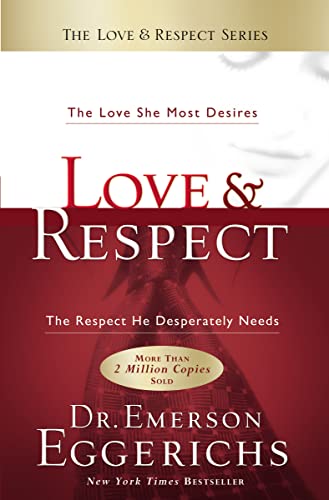The Scriptures unequivocally establish that no husband has ever an excuse to demean his wife – even if she exhibits disrespect herself.
Through common-grace wisdom, researchers have confirmed what the Bible has been teaching for centuries—disrespect, dishonor, and contempt are poison for a marriage relationship. Grounded in four decades of research, Dr. John Gottman has famously found contempt to be not only the most destructive element in an unhealthy marriage, but the leading predictor of future divorce.
In the words of an article published by the Gottman Institute, “Treating others with disrespect and mocking them with sarcasm and condescension are forms of contempt. So are hostile humor, name-calling, mimicking, and body language such as eye-rolling and sneering. In whatever form, contempt is poisonous to a relationship because it conveys disgust and superiority…” Treating someone else with disrespect is a symptom of a deeper problem. Disrespect is not incidental but fundamental to arrogance and self-righteousness. It is impossible for a husband to treat his wife with disrespect unless he ultimately views her as “less than” and beneath him.
If a wife finds herself on the receiving end of constant contempt from her husband, it can feel confusing and disorienting. She may be tempted to believe his contempt is her fault, especially if he repeatedly tells her so! But if a husband is acting contemptuously towards his wife, Scripture places the accountability for his contempt squarely on him. But where and how does Scripture teach this?
What Does the Bible Say About Marriage?
Beginning in Genesis, Scripture clearly states both men and women are equal in dignity, value, and worth—and therefore equally worthy of respect. Why? Because both men and women are equally made in the image of God. “So God created man in his own image, in the image of God he created him; male and female he created them” (Gen 1:27). As image-bearers, wives are inherently worthy of being treated with respect, honor, and dignity by their husbands.
In the very next chapter, we read “Therefore a man shall leave his father and his mother and hold fast to his wife, and they shall become one flesh” (Gen 2:24). Jesus himself quotes Genesis 2:24 and unpacks it further when he says “But from the beginning of creation, ‘God made them male and female.’ ‘Therefore a man shall leave his father and mother and hold fast to his wife, and the two shall become one flesh.’ So they are no longer two but one flesh. What therefore God has joined together, let not man separate” (Mk 10:6–10).
Jesus is saying that God’s design for marriage is preservation and permanence. Marriage is meant to last a lifetime, but that will require a man to not only “hold fast to his wife,” but also to “let not man separate” what “God has joined together.” A husband who dishonors his wife hacks at the roots of the marriage tree. Instead of protecting and nourishing their marriage, his dishonor undermines their marriage.
Suggested Resource:
Written By: Dr. Emerson Eggerichs
This is a great book for further understanding the dynamics of marriage. Whether you're dealing with a disrespectful wife or husband, this book has a lot of tools to help.
How Does the Bible Instruct Husbands?
Paul warns, “Husbands, love your wives, and do not be harsh with them” (Col 3:19). Paul is saying “Husbands, do not relate to your wives in such a way that you stir up bitter feelings by your harsh words or harsh treatment.” Surely Colossians 3 leaves no room for disrespect.
Similarly, Paul gives clear instructions to husbands in Ephesians 5 when he writes, “Husbands, love your wives, as Christ loved the church and gave himself up for her… In the same way husbands should love their wives as their own bodies. He who loves his wife loves himself. For no one ever hated his own flesh, but nourishes and cherishes it, just as Christ does the church…” (Eph 5:25, 28–29). This word translated “nourish” carries with it the idea of feeding someone with the metaphorical “food” they’ll need to flourish. God intends husbands to speak to and care for their wives in such a way that their wives are filled up and strengthened. We should seek to build up, never to offend.
The Bible also instructs husbands to flee from sexual immorality and honor the marriage bed. So husbands who are addicted to pornography, constantly masturbating, or flirting with other women can certainly be disrespectful as well – even if it’s not abundantly obvious.
Wives should experience their husbands as “nourishing.” Similarly, the word translated “cherish” is used elsewhere of a nursing mother who cares tenderly for her children (1 Thess 2:7), and is built on the literal idea of providing warmth.
Paul is saying in Ephesians 5 that wives should experience their husbands as a source of spiritual, emotional, and psychological sustenance and safety. A well-loved wife should receive metaphorical food and shelter from her husband. With his words and his actions, a husband should make his wife feel safe, covered, cared for, and considered—not attacked, demeaned, or exposed. This does not mean that a wife should feel dependent on, controlled by, or beneath her husband, but rather that his presence should lead to her flourishing rather than her withering. To lead her to anything else is a form of hypocrisy.
How Does the Bible Instruct Wives in Regard to Their Husbands?
It is right and good that a broader cultural awareness has arisen around the dynamics of power and powerlessness in relationships. All through Scripture, people who typically possess less cultural power are singled out by God for protection and care (Ex 22:21–24; Ps 68:5; Jas 1:27). However, alongside the danger of failing to protect the powerless, is another danger of failing to see our ethical obligation to act honorably even when we are treated with dishonor—whether by authorities, anyone seeking our harm, or, yes, even a spouse.
People with less power should be protected and people with less power should still seek to cultivate lives of love and honor, even when that honor is not reciprocated (1 Pet 3:16).
Wives are to fight the urge to hold a grudge.
Dealing with a Disrespectful Husband as a Christ Following Wife
Therefore it is unsurprising that Scripture urges wives to treat their husbands with honor and respect—not because their husbands have earned it or deserve it, but because Jesus is worth it. Peter writes to the wives of unbelieving husbands, “Likewise, wives, be subject to your own husbands, so that even if some do not obey the word, they may be won without a word by the conduct of their wives, when they see your respectful and pure conduct” (1 Pet 3:1).
Their respectful conduct might actually win over their husbands, and convince them of the reality of Christ’s lordship because it so clearly demonstrates their souls’ anchoring in something far more profound and eternal than the approval of their husbands.
That is why Paul can begin by saying “Wives, submit to your own husbands…” but conclude by saying “…as to the Lord” (Eph 5:22). Wives are not called to honor their husbands because they are always necessarily worthy of honor, but because Jesus is. Honoring them is an offering of worship to the Father.
Does the Bible Mention What To Do About Abuse within a Marriage?
It is extremely important to stress at this point that, though a wife is called to treat her husband with honor and respect, that does not give license for a wife to remain in an unsafe environment. A wife is not honoring her husband by allowing him to endanger her. Any wife who is experiencing danger should contact law enforcement first, and her pastors second, and be physically removed to safety immediately.
Establishing physical safety is not at odds with seeking to repair and redeem a broken marriage. In fact, the more a wife is able to courageously remove herself from an abusive situation, the more she honors God’s intention for marriage, and actually helps prevent her husband from continuing to sin against her in this egregious way.
But what constitutes abuse? Darby Strickland is a Christian counselor with several decades of experience with abuse and in her seminal book Is It Abuse: A Biblical Guide to Identifying Domestic Abuse and Helping Victims, she offers the following helpful definition:
Abuse occurs in a marriage when one spouse pursues their own self-interests by seeking to control and dominate the other through a pattern of coercive, controlling, and punishing behaviors. This controlling pattern of behavior is commonly called domestic abuse or domestic violence. I like to use the term oppression, since it provides a framework for this behavior that is addressed in Scripture and captures the domination that it involves. No matter what form oppression takes, its intended outcome is the same: to punish and wound a victim so that an oppressor gets their world the way they want it.
And one note – especially when it comes to sexual abuse – it’s not the wife’s fault. Regardless how she behaves or whether or not she shows off her body, the sin lies with the abuser.
If a woman is unsure as to whether she might be in an abusive relationship, the good news is that she does not have to try and answer that question alone. Civil authorities, caring local church leaders, and skilled counselors will all help her gain clarity on what she is experiencing. Abusers always work to retain power and control over their victims by silencing and isolating them. Bringing what is hidden into the open, and shining a light into dark places, is the first step towards receiving help and freedom.
While it is godly when Christians bear up under persecution (Matt 5:11; Rom 12:14), contrary to what a confused and worn-down wife might think herself, or be misled to believe, “God never calls us into violence if it can be avoided.” Justin Holcomb explains:
We are not called to passively accept every form of unjust pain that comes our way—especially not abuse. This is not an idea that comes from Scripture. Rather, Scripture shows us a complex and multifaceted view of human suffering, and so we must not be simplistic in our counsel to ourselves and to others who face unjust suffering. Scripture does not encourage people to endure avoidable suffering and it does encourage them to avoid unnecessary suffering. Let us not fall into the trap of thinking that if you decide to take steps to end the abuse, you are being a bad Christian.
Christian wives may tend to be slower to speak up when enduring abuse, out of a misguided belief that it is God’s will for them to suffer in silence, but nothing could be further from the truth. Get help. Don’t procrastinate.
What Does the Bible Say About a Disrespectful Husband?
If a wife finds herself on the receiving end of constant contempt from her husband, it can feel confusing and disorienting. But Scripture is clear. Wives should experience their husbands as a source of spiritual, emotional, and psychological sustenance and safety. This does not mean that a wife should feel dependent on, controlled by, or beneath her husband, but rather that his presence should lead to her flourishing rather than her withering.
1. Lisitsa, Ellie, “The Four Horsemen: Contempt,” accessed May 9, 2022, https://www.gottman.com/blog/the-four-horsemen-contempt/
2. Frederick W. Danker, Walter Bauer, and William Arndt, A Greek-English Lexicon of the New Testament and Other Early Christian Literature, 3rd ed (Chicago: University of Chicago Press, 2000), 812.
3. Darby A. Strickland, Is It Abuse? A Biblical Guide to Identifying Domestic Abuse and Helping Victims (Phillipsburg, New Jersey: P&R Publishing, 2020).
4. Justin S. Holcomb, Is It My Fault? Hope and Healing for Those Suffering Domestic Violence (Chicago: Moody Publishers, 2014), 127.






